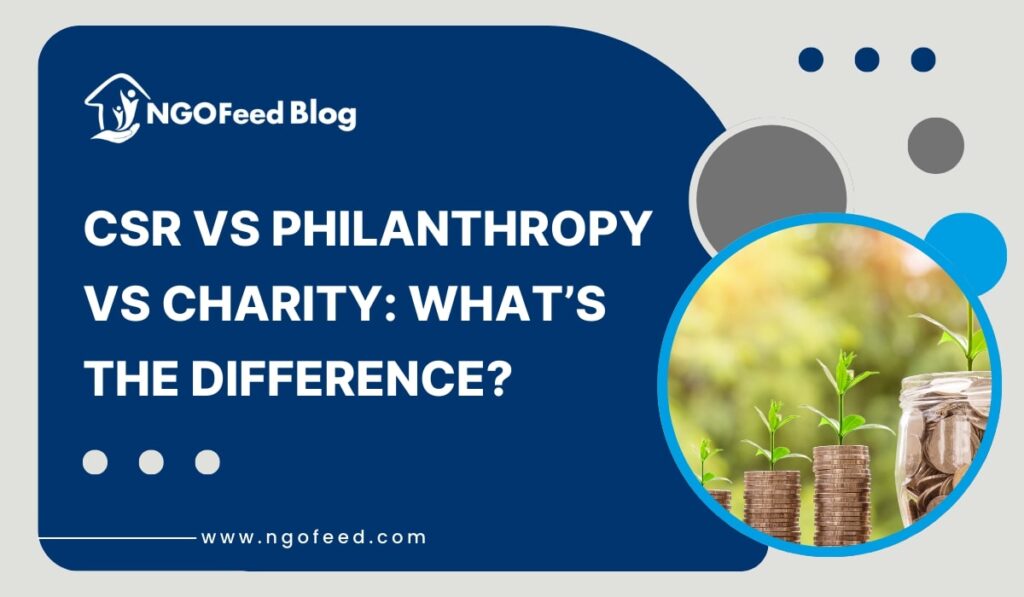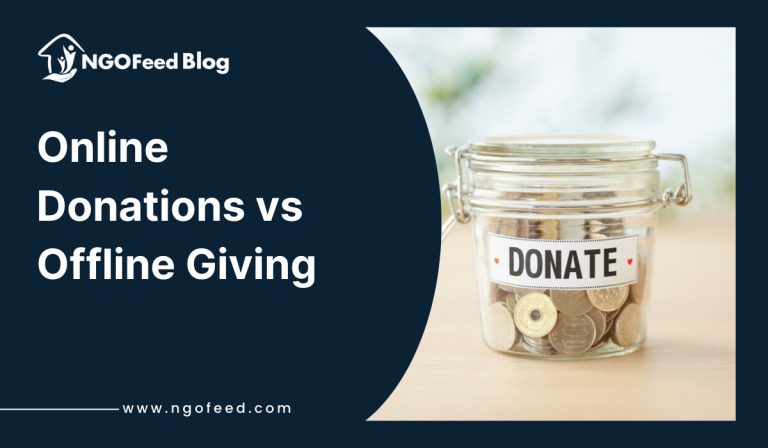CSR Vs Philanthropy Vs Charity: More and more people and groups are stepping up today to assist society in a variety of ways. Though they don’t mean the same thing, you can sometimes hear the terms CSR, philanthropy, and charity used together. Although all three try to improve the world, their objectives, methods, and ultimate effects vary. Knowing these distinctions clarifies how companies and people can better support society’s progress.
In today’s world, where businesses and individuals are increasingly expected to contribute to the betterment of society, the terms Corporate Social Responsibility (CSR), philanthropy, and charity are often used interchangeably. However, despite their shared goal of social good, each concept has distinct meanings, purposes, and approaches.
Table of Contents
CSR Vs Philanthropy Vs Charity
Understanding these differences is crucial for organizations, policymakers, and citizens who wish to engage in meaningful social change.
1. Charity: Quick Action
The most conventional and emotionally charged kind of gift is charity. Originating from the heart, its attention is on assisting those in urgent need. Giving money, food, or clothing to those impacted by poverty, disease, or catastrophes is among the acts of philanthropy.
Although charity offers rapid relief, like blankets during a flood or meals to the hungry, it usually does not address the underlying causes of those crises. Though transient, it shows compassion and is really helpful in crises.
Donating food packages to impoverished families or helping to a relief fund following a natural catastrophe is an illustration.
Also Read: Government Grants vs Corporate CSR Funding
In essence, Charity is about kindness and fast aid.
2. Philanthropy: Developing long-lasting change.
Giving more strategically and over time is philanthropy. It searches for solutions to the underlying causes of social issues rather than only dealing with current needs. Usually, philanthropists meticulously plan their donations via funding education, healthcare, environmental preservation, or research.
Often driven by people, families, or organizations seeking to create lasting change, philanthropy is It emphasizes empowerment rather than short-term assistance.
Example: Creating a scholarship fund for impoverished children or constructing a hospital in a rural location.
Briefly speaking: Philanthropy is about strategy and creating a long-lasting impact.
3. CSR: Active Responsibility
Corporate Social Responsibility (CSR) is the way companies assume accountability for their effects on the environment and society. It’s about operating a company ethically, sustainably, and in a way that is community-friendly, not only donating money.
Modern corporations depend on corporate social responsibility (CSR). Companies embrace CSR to return something to society and simultaneously boost their brand reputation and foster client confidence. CSR initiatives might involve encouraging education, preserving the environment, guaranteeing just labor practices, and fostering local growth.
Example: A corporation changing to environmentally friendly packaging, sponsoring youth skill development initiatives, or installing solar panels in rural institutions.
Also Read: Best Practices for NGO Financial Reporting and Audits
In brief: CSR is doing good while operating a company.
At a Glance: CSR Vs Philanthropy Vs Charity – The Key Differences
| Aspect | Charity | Philanthropy | CSR |
|---|---|---|---|
| Main Focus | Immediate help | Long-term solutions | Responsible business practices |
| Time Frame | Short-term | Long-term | Ongoing |
| Who Leads It | Individuals or small groups | Foundations or individuals | Companies and organizations |
| Goal | Relieve suffering | Empower and develop | Integrate ethics and sustainability |
| Example | Donating to flood victims | Funding a school or hospital | Reducing carbon emissions or supporting local farmers |
How do They Cooperate in it?
Not in competition are charity, philanthropy, and corporate social responsibility; rather, they complement one other wonderfully. Charity touches the heart; CSR helps the system; philanthropy shapes the mind.
One could start by giving to a catastrophe (charity),
Later, help a long-term project such as education for needy kids (philanthropy).
And eventually, as part of an organization, incorporate sustainability into corporate operations (CSR).
Every level broadens the effect—from empathy to empowerment to moral accountability. All three combine to form a ring of charity, development, and sustainability.
Why knowing the distinctions is vital
Knowing how to give properly becomes especially important in a society confronted by challenges like inequity, climate change, and unemployment. Though random acts of goodness are great, deliberate and responsible behavior greatly increases their impact.
For people, it entails shifting from single gifts to supporting causes that help create change.
For companies, it means connecting profit with purpose and gauging influence.
It means for society to construct a culture whereby responsibility and empathy go hand in hand.
Learning how to provide not just with our hearts but also with our brains and actions follows from an understanding of the distinctions among charity, philanthropy, and CSR.
Also Read: How to Attract Foreign Donors to NGO
Conclusion
Making the world a better place depends critically on all three types of giving: charity, philanthropy, and corporate social responsibility.
In times of hardship, kindness offers hope.
Future opportunities arise from philanthropy.
CSR guarantees that companies expand alongside society.
From aiding others, to enabling others, to being responsible for others, they together mirror the development of human kindness. Your donation can have ripples of good change reaching well beyond you whether you are a single donor, a philanthropist, or a business leader.
We make a life by what we give; we make a living by what we get.
Also Read: How to Apply for Government Grants for NGO
Frequently Asked Questions (FAQs)
Is CSR the same as charity?
No. While charity involves giving for immediate relief, CSR is a structured business practice that focuses on long-term social and environmental responsibility. Charity is emotional and personal; CSR is strategic and policy driven.
Can a company do both CSR and philanthropy?
Yes, absolutely. Many companies engage in both. CSR ensures that their business operations are ethical and sustainable, while philanthropy allows them to fund long-term community projects beyond business interests.
Why is CSR important for businesses?
CSR builds trust, enhances a company’s reputation, improves employee morale, and strengthens relationships with customers and communities. It also ensures compliance with laws and global sustainability standards.
How does philanthropy differ from charity?
Philanthropy focuses on solving problems at their root through education, empowerment, and innovation. Charity, on the other hand, provides immediate help during crises or emergencies.









